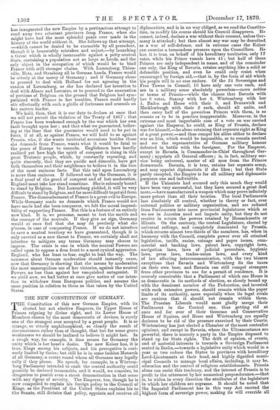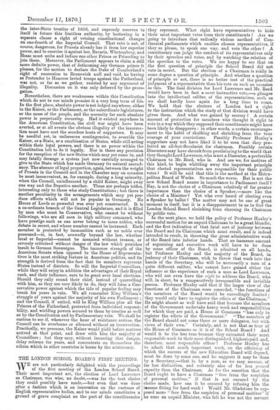THE NEW CONSTITUTION OF GERMANY.
THE Constitution of this new German Empire, with its elected but not elective Emperor, its Upper House of Princes reigning by divine right, and its Lower House of Members chosen by the most democratic of devices, is surely one of the strangest ever accepted by a great people. It is so strange, so utterly unphilosophical, so clearly the result of circumstances rather than of thought, that but for some grave weaknesses we should be inclined to believe it might last. In a rough way, for example, it does secure for Germany the unity which is her heart's desire. The new Kaiser has, it is true, Kings among his subjects, and his prerogative is curi- ously limited by theirs; but still he is in some fashion Monarch of all Germany, a centre round whom all Germans may legally rally if they please. No speech, for example, in a Wiirtem- berg Parliament intended to exalt the central authority could possibly be declared treasonable, and it would, we conceive, be -dangerous to punish even a street demonstration in that sense with any rigour of severity. The Emperor, too, though he is now compelled to explain his foreign policy to the Council of Kings, as the President of the United States explains his to the Senate, still dictates that policy, appoints, and receives all highest form of sovereign power, making its will override all diplomatists, and is in no way obliged, as we read the Constitu- tion, to modify his course should his Council disapprove. He cannot, indeed, declare a war without their consent, unless Ger- many is attacked ; but then almost any war may be described, as a war of self-defence, and in extreme cases the Kaiser can exercise a tremendous pressure upon the Councillors. He has, it is true, on behalf of his hereditary territories, only 17 votes, while his Prince vassals have 41; but half of these Princes are only independent in name, and of the remainder one only, the King of Bavaria, retains anything like a solid or defensible position, and even he could only resist when encouraged by foreign aid,—that is, by the form of aid which his people will in no case endure. Of the 24 Sovereigns and Free Towns in Council, 16 have only one vote each, and are in a military sense absolutely powerless—mere nobles or towns of Prussia—while the chance that Bavaria with her 6 votes, Saxony with her 4, Wiirtemberg with her 4, Baden and Hesse with their 3, and Brunswick and Mecklenburgh with their 2 each, should all unite, and then carry half of the powerless Princes with them, is so remote as to be in practice inappreciable. Moreover, in the extreme and most improbable case of a vote on war carried against the Emperor, he could, as King of Prussia, declare war for himself,—he alone retaining that separate right as King of a great power,—and thus compel his allies either to declare war on him, which would be impossible, or to remain neutral and see the representative of German military honour defeated in battle with the foreigner. For the Emperor, except in Bavaria, is Commander-in-Chief throughout Ger- many ; appoints all General officers ; is, in fact, military ser- vice being universal, master of all men from the Princes downwards. Bavaria, it is true, retains her separate army, and may appoint diplomatists if she likes ; but that State partly excepted, the Empire is for all militaay and diplomatic purposes one and indivisible.
If the Unionists had secured only this much they would have been very successful, but they have secured a great deal more,—have manufactured a weapon which may prove infinitely more potent than all their treaties. The local Parliaments lose absolutely all control, whether in theory or fact, over external politics or military organization, and are reduced from Parliaments into mere provincial legislatures which as we see in America need not impede unity, but they do not receive in return the powers retained by Massachusetts or Illinois. On the contrary, the central Legislature, elected by universal suffrage, and completely dominated by Prussia, which returns almost two-thirds of the members, has, when in harmony with the Council, complete power over all criminal legislation, tariffs, excise, coinage and paper issues, com- mercial and banking laws, patent laws, copyright laws, navigation laws, laws of judicial procedure, hygienic laws, press laws, trades-union laws, and every kind of law affecting intercommunication, with the two bizarre exceptions that Bavaria and Wiirtemberg fix the taxes on their own beer, and Bavaria can still compel strangers from other provinces to sue for a permit of residence. It is scarcely conceivable that a Parliament of which one House is so democratic in its methods of election, so closely bound up with the dominant member of the Federation, and invested with such extensive powers, should remain within the paper limits of its authority, more especially when its legal rivals are anxious that it should not remain within them. The Prussian Liberals would most gladly merge their Parliament in the Central one, thus getting rid at once and for ever of their tiresome and Conservative House of Squires, and Hesse and Wiirtemberg are equally desirous to be rid of the pressure exercised by their Courts. Wiirtemberg has just elected a Chamber of the most centralist opinions, and except in Bavaria, where the Ultramontanes are powerful, there is scarcely a party in the 'Empire disposed to stand up for State rights. The drift of opinion, of events, and of material interests is towards a Sovereign Parliament seated in Berlin,—towards a legislative unity which would in a year or two reduce the States to provinces with hereditary Lord-Lieutenants at their head, and highly dignified muni- cipal Councils to manage local affairs, including, it may be, education and the control of religious establishments. Prussia alone can resist this tendency, and the interest of Prussia is to profit to the uttermost by her numerical preponderance,—that is, to widen in every direction the attributes of the legislature in which her children are supreme. It should be noted that the Imperial Parliament has in this very Act exerted the the Senate, still dictates that policy, appoints, and receives all highest form of sovereign power, making its will override all
the inter-State treaties of 1856, and expressly reserves to itself in future this limitless authority, by bestowing in a separate clause a right of vetoing constitutional changes on one-fourth of the Imperial Council. That veto is not, of course, dangerous, for Prussia already has it from her superior power, and to exercise it against her, Bavaria, Wiirtemberg, and Hesse must unite and induce one other Prince or Princeling to join them. Moreover, the Parliament appears to claim a still more definite power, that of dethroning any German prince it pleases, for the motion to declare the Duke of Cumberland's right of succession to Brunswick null and void, he having as Pretender to Hanover levied troops against the Fatherland, was not, so far as we gather, resisted by any argument of illegality. Discussion on it was only deferred by the proro- gation.
Nevertheless, there are weaknesses within this Constitution which do not to our minds promise it a very long term of life. In the first place, absolute power is not lodged anywhere, either in the Kaiser, or the Parliament, or the subordinate legislatures, or the mass of the people, and the necessity for such absolute power is perpetually recurring. Had it existed anywhere in the American Constitution, the civil war might have been averted, or at all events the obvious illegality of the insurrec- tion must have cost the seceders hosts of supporters. It may be needful yet, in unforeseen contingencies, to override the Kaiser, or a State, or a combination of States, while still acting within their legal powers, and there is no power within the Constitution left to do it legally. Nor is there any provision for the reception of the new States which may yet come in, and may fatally derange a system just now carefully arranged to give to the State which has made Germany its natural ascend- ancy. The absence of legal proportion, again, between the weight of Prussia in the Council and in the Chamber may on occasion be most inconvenient, as, for example, during a long minority, when the Council, uninfluenced by a child Kaiser, might sway one way and the Deputies another. These are perhaps trifles, interesting only to those who study Constitutions ; but there is another peculiarity in the arrangements which may yet pro- duce effects which will not be popular in Germany. No House of Lords so powerful was ever yet constructed. It is a co-ordinate branch of the Central Legislature, and it is filled by men who must be Conservative, who cannot be without followings, who are all men in high military command, who have prestige such as can never belong to mere nobles, who debate in secret, and whose number cannot be increased. Each member is protected by immunities such as no noble ever possessed—is, in fact, avowedly beyond the law, whether local or Imperial—cannot be menaced without treason, or severely criticized without danger of the law which punishes insult to German Sovereigns. The immense strength of the American Senate when opposed to the House of Representa- tives is the most striking feature in American politics, and its strength is derived from the fact that its members represent States instead of districts. So will the Imperial Councillors, while they will enjoy in addition the advantages of their Royal rank, and their influence, sure to be great over local elections. Should they rally round their chief, instead of quarrelling with him, as they are very likely to do, they will form a Con- servative power against which the tide of popular feeling may break for years in vain. We all remember King William's struggle of years against the majority of his own Parliament ; and the Council, if united, will be King William plus all the Princes of the Fatherland, protected from individual responsi- bility, and wielding powers secured to them by treaties as well as by the Constitution and by Parliamentary vote. We shall be curious to see if, whenever the hour of resistance arrives, the Council can be overborne or silenced without an insurrection. Practically, we presume, the Kaiser would yield before matters arrived at that point, and draw with him the majority of Councillors ; but they may, without incurring that danger, delay reforms for years, and concentrate on themselves the odium which in other countries is borne by the aristocracy.







































 Previous page
Previous page